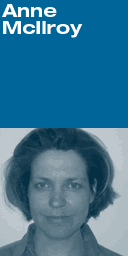 |
|
| ||||||||||||||||||||||||||||||||||||||||||||||||||||||||||||||||||||||||||||||||||||||||||||||||||||||||||||||||||||||||||||||||
 |
|
| ||||||||||||||||||||||||||||||||||||||||||||||||||||||||||||||||||||||||||||||||||||||||||||||||||||||||||||||||||||||||||||||||

|
Ottawa dispatch Prozac scandal 'besmirches' Canadian university The University of Toronto's decision to shun a British academic has cast doubts over the integrity of its scientific research, reports Anne McIlroy Monday September 10, 2001 Canada's largest and most prestigious university and has come under fire from two Nobel laureates and 25 other internationally respected scientists for withdrawing a job offer to a UK researcher after he questioned the safety of antidepressants like Prozac. In a letter, the 27 scientists say the decision to send Dr David Healy packing violated the principles of academic freedom, "besmirched" the name of the University of Toronto and "poisoned the reputation" of the centre for addiction and mental heath (CAMH), an affiliated teaching hospital. Dr Healy, who works at the University of Wales, had been courted by the centre for more than a year to direct its mood and anxiety disorders program. But the job offer was hastily withdrawn last November after he gave a speech in which he said Prozac and similar antidepressants may trigger suicide or violent behaviour in some patients. He also said that Eli Lilly, the drug company who has sold the product to 40m people, has known about the problem for years. Eli Lilly is a major corporate donor to the CAMH. Its officials say they dropped the scientist because of his "extreme" views, but deny the decision had anything to do with Eli Lilly. The company also denies any involvement, and says Prozac is safe. But critics say Dr Healy's job offer appears to have been rescinded in order to avoid offending the corporate giant, or for fear it would make it more difficult to solicit donations or research partnerships in the future. This week, 27 experts in Dr Healy's field of neuropsychopharmacology weighed in on the side of the critics, denouncing the Univerity of Toronto and its teaching hospital. The experts included Dr Arvid Carlsson, this year's Nobel prize winner in medicine and Julius Axelrod, the 1970 winner. They said Dr Healy's views are not extreme, and that the last-minute decision to revoke his job offer will have a chilling effect on researchers whose findings are not pleasing to drug companies. The incident has raised questions in Canada about the growing influence of pharmaceutical and biotechnology companies at the country's cash-strapped universities. The pharmaceutical industry now funds 42 per cent of all medical research in Canada, and accounts for between 16 and 30 per cent of the funding at major medical schools. The Canadian government has fostered these close ties, following the trend in the US, where universities are even more dependent on corporate funding. Universities in the UK and Europe are less dependent, but experts say many are eyeing the North American approach. No one at the University of Toronto teaching hospital would speak publicly in defence of Dr Healy, though privately many said they were outraged by what had happened. He was surprised by the silence, and says if the incident had taken place in the UK, his fellow academics would have spoken out. "I wouldn't have expected the party discipline - as it were - to be quite so rigid, to have to have quite the cagey fearful response there has been," he said. Other articles Useful links | |||||||||||||||||||||||||||||
 |

|